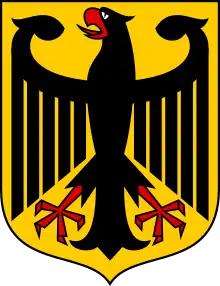Germany–Mexico relations
Germany–Mexico relations refers to the diplomatic relations between Germany and Mexico. Both nations are members of the G-20 major economies, Organisation for Economic Co-operation and Development and the United Nations.
 | |
Germany |
Mexico |
|---|---|
History
19th century
_-_MAZATLAN%252C_MEXICO.jpg.webp)
German clergy and technicals arrived to colonial Mexico during Spanish colonization of the country.[1] One of the first contacts between Germany and Mexico was via the expedition of Alexander von Humboldt who arrived in Mexico in 1803 and remained for one year mapping Mexican topography and studying its culture and history. Diplomatic relations between Mexico and Germany were established on 23 January 1879 after the unification of Germany.[2]
During the Second Mexican Empire and the reign of Maximilian I of Mexico, Germans were brought to Mexico to settle in Mexico's southern states, primarily in Yucatán. In 1890, Mexican President Porfirio Díaz and German Chancellor Otto von Bismarck collaborated to bring 450 German families to the Mexican state of Chiapas where they settled in the town of Soconusco to develop the region's agriculture industry.[3] Several German migrants would immigrate to primarily northern Mexico and helped develop several towns such as the port of Mazatlán and Mexico's brewing industry.
20th century

During World War I (1914-1918) Mexico remained neutral. During this time, Mexico was preoccupied with its revolution (1910-1920) which took place the same time as World War I. In January 1917, British agents intercepted a telegram sent to German Ambassador to Mexico Heinrich von Eckardt by Arthur Zimmermann, State Secretary for Foreign Affairs of the German Empire. In the telegram, Germany proposed to Mexico that if the United States were to join the war, Mexico should join and side with the Central Powers. In appreciation, and if the Central Powers were to win, Mexico would recuperate the territory of Texas, New Mexico and Arizona that Mexico lost in its war with the United States during the Mexican–American War in 1848. The telegram, known as the Zimmermann Telegram was intercepted when the telegram was being wired to the German embassy in Washington, DC to be re-routed to Mexico City. Mexico eventually rejected the telegram and continued to remain neutral during the war.[4]
During the Spanish Civil War, 1936–1939, Mexico and Germany supported opposing sides of the conflict, with Mexico supporting the Republicans and Nazi Germany supporting the Nationalists. This put Mexico and Germany against each other, ultimately placing a largely negative interaction between the two.
On 22 May 1942, Mexico declared war on Germany during World War II. The decision for war was made by Mexican President Manuel Ávila Camacho after German U-boats destroyed two Mexican oil tankers in the Gulf of Mexico; the SS Potrero del Llano and SS Faja de Oro, both carrying crude oil to the United States. Mexico is only one of two Latin-American nations to contribute soldiers during the war (the other nation being Brazil). More Mexican troops fought in the Philippines than in Europe. However this didn't discourage Germany from making their own visits. Diplomatic relations between the two nations were re-established on 16 April 1952.[2]
After World War II, Mexico maintained diplomatic relations with both the Federal Republic of Germany (West Germany) and the German Democratic Republic (East Germany).[5] During this time period, Mexico maintained an embassy in Bonn.[6] After the reunification of Germany in 1990, Mexico established relations with the Federal Republic of Germany and in the year 2000, Mexico moved its embassy to its current location in Berlin.[6]
21st century
There have been several high-level visits between leaders of both nations. In June 2017, German Chancellor, Angela Merkel, made an official visit to Mexico, and met with Mexican President Enrique Peña Nieto. Both leaders reaffirmed the strength of the bilateral relationship, which is based on shared values such as democracy and the promotion of free trade. Both nations all focused on the joint collaboration in the defense of multilateralism, cooperation for sustainable development, attention to the migration phenomenon and the fight against climate change, among other issues.[2]
High-level visits
.jpg.webp)
High-level visits from Germany to Mexico
- Secretary General of East Germany Erich Honecker (1981)
- Chancellor of West Germany and unified Germany Helmut Kohl (1984, 1996)
- President Roman Herzog (1999)
- Chancellor Gerhard Schröder (2002)
- President Johannes Rau (2003)
- President Horst Köhler (2004)
- Chancellor Angela Merkel (2008, 2012, 2017)
- President Christian Wulff (2011)
High-level visits from Mexico to Germany
- President Adolfo López Mateos (1963)
- President Luis Echeverría Álvarez (1974)
- President Miguel de la Madrid Hurtado (1985)
- President Carlos Salinas de Gortari (1991)
- President Ernesto Zedillo (1997)
- President Vicente Fox (January and October 2001, 2003)
- President Felipe Calderón (January and June 2007, 2010)
- President Enrique Peña Nieto (2016, 2017, 2018)
Bilateral agreements
Both nations have signed several bilateral agreement such as an Agreement for the Protection of the Rights of Author of Musical Works (1954); Agreement on Reciprocity in Legal Aid (1956); Agreement of Air Transportation (1967); Agreement of Scientific and Technological Cooperation (1974); Agreement of Cultural Cooperation (1977); Agreement on the Promotion and Reciprocal Protection of Investments (1998); Agreement to Avoid Double Taxation and Tax Evasion in Income Tax and Equity Tax (2008) and an Agreement of Technical Cooperation (2012).[7]
Migration
There is a sizable German origin community in Mexico that thrives and several prominent Mexican politicians, journalists, artists and actors are of German descent. There is also a Mennonite community in Mexico with approximately 100,000 members in Northern Mexico of predominantly German origin.[8]
Transportation
There are direct flights between both nations with the following airlines: Condor, Eurowings and Lufthansa.
Trade relations
In 1997, Mexico signed a Free Trade Agreement with the European Union (which includes Germany). In 2018, two-trade between both nations amounted to US$24.8 billion.[9] Germany is Mexico's biggest trading partner within the European Union and fifth biggest globally. At the same time, Mexico is Germany's second biggest trading partner in Latin America (after Brazil). Germany's main exports to Mexico include: machinery, automobiles, chemical based products, pharmaceutical products and medical technology. Mexico's main exports to Germany include: automobiles and automotive parts, as well as products from the electronics industry.[2]
There are over 1,300 German companies based in Mexico with a total capital amounting to US$25 billion.[10] Several German multinational companies invest and operate in Mexico such as Audi, Bayer, BMW, Deutsche Bank, Mercedes-Benz, Siemens and Volkswagen (among others). Mexican multinational companies such as Cemex, Grupo Alfa, Mexichem and Nemak (among others) operate in Germany.[2]
Resident diplomatic missions
- Germany has an embassy in Mexico City.[11]
- Mexico has an embassy in Berlin and a consulate in Frankfurt.[12][13]
 Embassy of Germany in Mexico City
Embassy of Germany in Mexico City Embassy of Mexico in Berlin
Embassy of Mexico in Berlin
See also
References
- Mexico and Germany: and old relationship looking into the future
- Bilateral relations between Mexico and Germany (in Spanish)
- México – Alemania (Historia de sus Relaciones) (in Spanish)
- Why was the Zimmermann Telegram so important?
- Erich Honecker in Ciudad de Mexico von Präsident Jose Lopez Portillo herzlich willkommen geheißen (in German)
- History of diplomatic relations between Mexico and Germany (in Spanish)
- Bilateral Agreements between Mexico and Germany (in Spanish)
- Mennonite community in Northern Chihuahua, Mexico
- Mexican Ministry of the Economy: Germany (in Spanish)
- "Area de Economía (in Spanish)". Archived from the original on 2017-07-15. Retrieved 2014-11-26.
- Embassy of Germany in Mexico City
- Embassy of Mexico in Berlin
- Consulate of Mexico in Frankfurt

